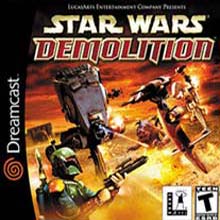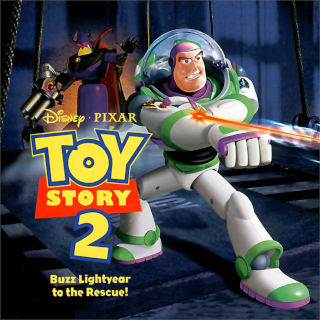
Gauntlet Legends is an arcade game released in 1998 by Atari Games and Midway Games. It is a fantasy themed hack and slash styled dungeon crawl game, a sequel to 1985's popular Gauntlet and 1986's Gauntlet II and marks the final game in the series to be produced by Atari Games. Its unusual features for an arcade game included passwords and characters that could be saved, enabling players to play over the course of a long period.

Starlancer is a space-based science fiction flight simulator computer game, created by Erin and Chris Roberts, and developed by Warthog Games under the auspices of Digital Anvil.

Star Wars: Demolition is a 2000 vehicular combat game created by Luxoflux and LucasArts using the Vigilante 8 game engine. It is set in the Star Wars universe, where the Galactic Empire has banned Jabba the Hutt's podraces, so Jabba creates a more life-threatening vehicular combat contest.

Dave Mirra Freestyle BMX is a 2000 BMX video game developed by Z-Axis and published by Acclaim Entertainment under their Acclaim Max Sports label. The game was released on the PlayStation, Game Boy Color, Dreamcast and Microsoft Windows. The player's main objective in the game is to choose one of the riders and work their way through a total of 12 different levels, completing objectives to unlock new equipment. It received "favorable" reviews. A sequel, Dave Mirra Freestyle BMX 2, released in 2001.

Fighting Force 2 is a beat 'em up/shooter video game, the sequel to 1997's Fighting Force. The game was released for the PlayStation and Dreamcast and was developed by Core Design and published by Eidos Interactive.

Ready 2 Rumble Boxing: Round 2 is a boxing game for the Dreamcast, Nintendo 64, PlayStation, PlayStation 2, and Game Boy Advance. It is the sequel to Ready 2 Rumble Boxing.

Evil Dead: Hail to the King is a survival horror video game developed by Heavy Iron Studios and published by THQ. Released for the PlayStation, Dreamcast, and Microsoft Windows, the game acts as a sequel to the 1992 film Army of Darkness. This was the second video game released to be based on the Evil Dead film franchise, following the 1984 title The Evil Dead, and was also the first video game to be developed by Heavy Iron Studios.

Chicken Run is a platform-stealth based 3-D platform video game based on the 2000 film of the same name. Developed by Blitz Games and published by Eidos Interactive and THQ, the game was released in November 2000, prior to the movie's home media release, for the PlayStation, Microsoft Windows, Dreamcast, and Game Boy Color. The game is a loose parody of the 1963 film The Great Escape. The Game Boy Color version is a 2D isometric puzzle-solving game. The game's plot centers about a band of chickens escaping from an egg farm from their evil owners and fighting for freedom.

Capcom vs. SNK: Millennium Fight 2000, also known as simply Capcom vs. SNK in international releases, is a 2000 head-to-head fighting game produced by Capcom originally released as a coin-operated arcade game for Sega's NAOMI hardware and later ported to the Dreamcast. It is the second game in the SNK vs. Capcom series and the first game in the series to be released for the arcade.

Mat Hoffman's Pro BMX is a 2001 BMX video game developed by Shaba Games and the first game to be published by Activision under the Activision O2 label. It is similar to the Tony Hawk's series and competed directly with Acclaim Entertainment's Dave Mirra Freestyle BMX. Despite a planned release in fall of 2000, the game was released in 2001 for the PlayStation and Game Boy Color, followed by Dreamcast, Microsoft Windows and Game Boy Advance. The PlayStation and Dreamcast versions received "favorable" reviews, while the PC and Game Boy Advance versions received "average" reviews. A sequel, Mat Hoffman's Pro BMX 2, was released in 2002.

Vanishing Point is a racing video game developed by Clockwork Games and published by Acclaim Entertainment for Dreamcast and PlayStation.

International Track & Field 2000 is a track and field game for PlayStation in 1999 and Nintendo 64 in 2000. It was released in Europe under the names International Track & Field: Summer Games on the Nintendo 64 and Game Boy Color, International Track & Field 2 on the PlayStation and International Track & Field on the PlayStation 2 and in Japan as Ganbare! Nippon! Olympics 2000, where it was licensed by the Japanese Olympic Committee. Versions were also released for the Sega Dreamcast, PlayStation 2, and Game Boy Color as ESPN International Track & Field in North America. Maurice Greene, a former men's WR holder in the 100M dash, is the cover athlete.

Razor Freestyle Scooter, known as Freestyle Scooter in Europe, is an extreme sports game released for the PlayStation, Game Boy Color, Dreamcast, Game Boy Advance and Nintendo 64.

Toy Story 2: Buzz Lightyear to the Rescue is a 1999 platform game developed by Traveller's Tales and published by Activision and Disney Interactive. Based on Disney/Pixar's 1999 computer animated film Toy Story 2, it was released for the Nintendo 64, PlayStation, Microsoft Windows, and Macintosh in late 1999, while a Dreamcast version followed in 2000. The computer versions were released under the title Disney/Pixar's Action Game, Toy Story 2. A different version, a side-scrolling platform game titled Toy Story 2, was also released for the Game Boy Color in 1999.

NBA Hoopz is a 2001 basketball video game published by Midway. It is the sequel to NBA Hangtime and NBA Showtime: NBA on NBC. Hoopz was the only 3-on-3, arcade-style basketball video game available during the 2000–01 NBA season. Shaquille O'Neal is featured on the game cover.

Disney's Dinosaur is a 2000 video game published by Ubi Soft, and functions as a tie-in to the Disney film of the same name.

Championship Surfer is an extreme sports video game developed by Krome Studios, published by Mattel Interactive in North American and GAME Studios in Europe, and released for Microsoft Windows, PlayStation and Dreamcast in 2000.

Le Mans 24 Hours is a video game released for the PlayStation, Game Boy Color, Dreamcast, PlayStation 2, and Microsoft Windows. The Dreamcast version was ported and published by Sega in Japan on 15 March 2001, while the PlayStation 2 version was ported and published by the same company on 13 June. Based on the famous 24 hours of Le Mans race in France, the player is invited to race the entire 24-hour endurance course or take part in a simpler arcade mode. The game also featured tracks such as Bugatti Circuit, Brno Circuit, Road Atlanta, Suzuka Circuit, Donington Park and Circuit de Catalunya, as well as a weather and night system.

Sno-Cross Championship Racing is an extreme sports video game. It was developed by Unique Development Studios and published by Crave Entertainment.

MTV Sports: Skateboarding Featuring Andy Macdonald is a sports video game developed by Darkblack and published by THQ for Game Boy Color, Microsoft Windows, PlayStation and Dreamcast. It features skateboarder Andy Macdonald on the cover.




















